Corporate Social Responsibility in Tourism
VerifiedAdded on 2020/11/23
|12
|4382
|255
Report
AI Summary
This assignment delves into the crucial role of corporate social responsibility (CSR) in shaping sustainable tourism practices. It examines various aspects of CSR within the tourism industry, including its impact on local communities, environmental protection, and economic development. Students will analyze ethical considerations, challenges faced by businesses in implementing CSR initiatives, and potential opportunities for promoting responsible and sustainable tourism.
Contribute Materials
Your contribution can guide someone’s learning journey. Share your
documents today.
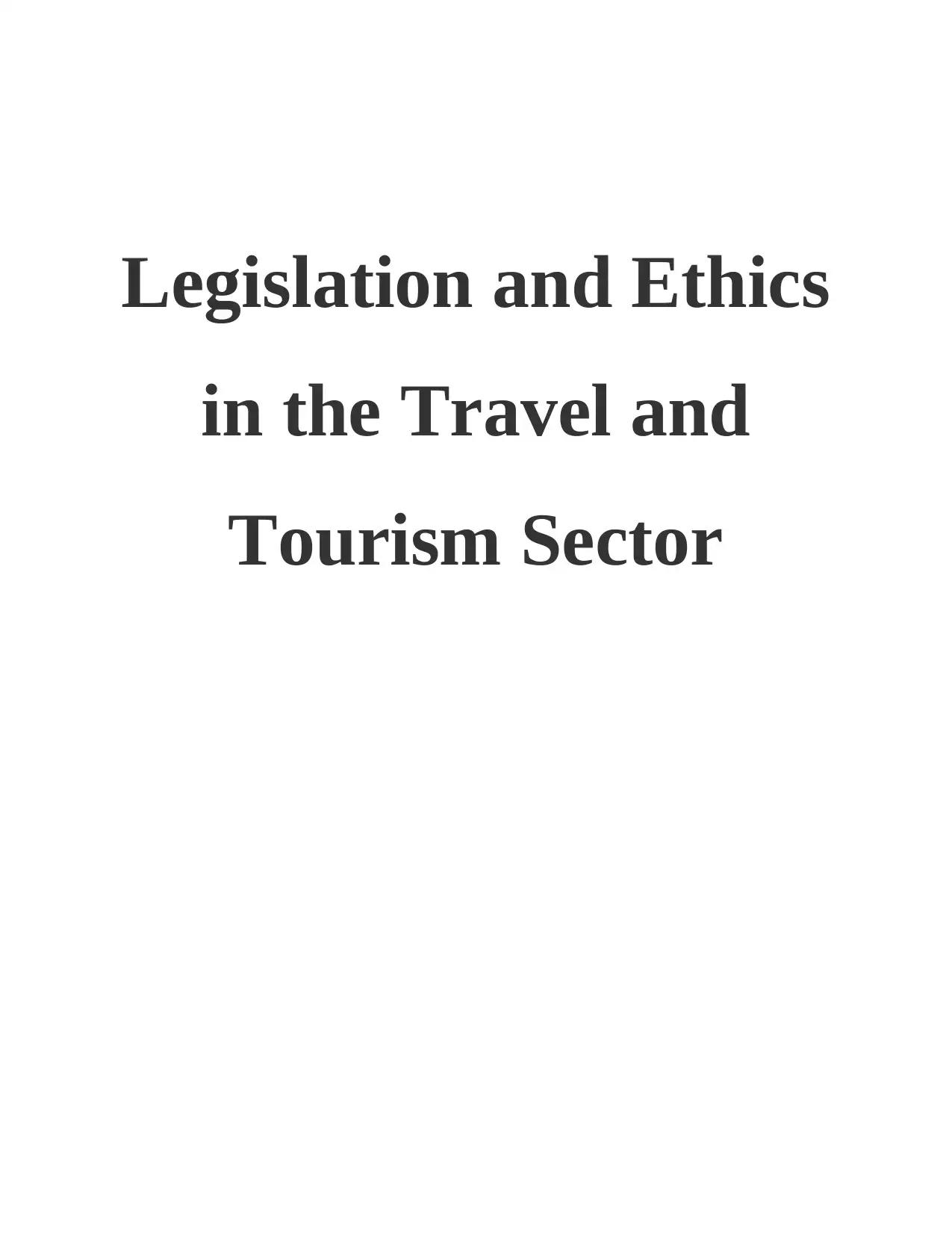
Legislation and Ethics
in the Travel and
Tourism Sector
in the Travel and
Tourism Sector
Secure Best Marks with AI Grader
Need help grading? Try our AI Grader for instant feedback on your assignments.
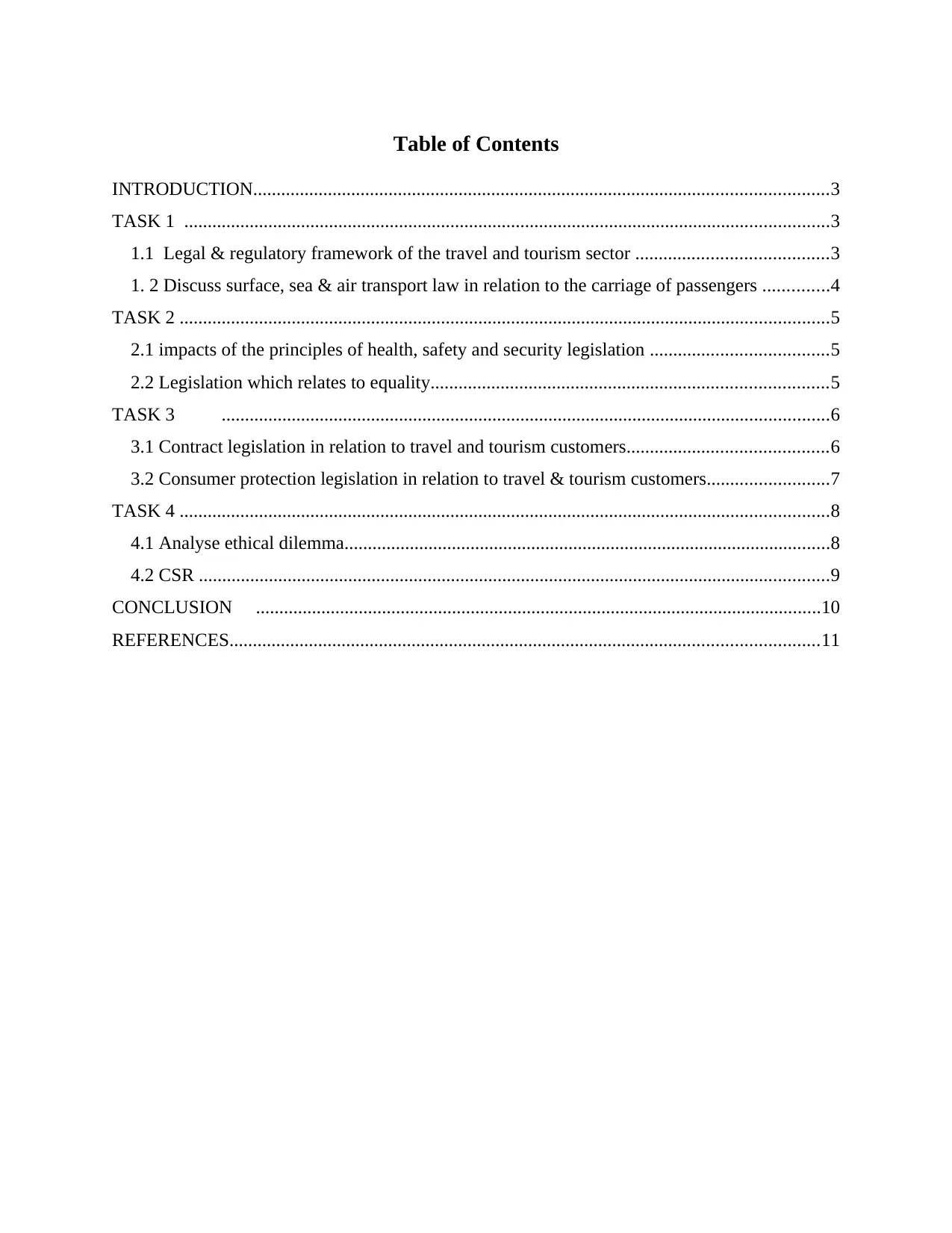
Table of Contents
INTRODUCTION...........................................................................................................................3
TASK 1 ..........................................................................................................................................3
1.1 Legal & regulatory framework of the travel and tourism sector .........................................3
1. 2 Discuss surface, sea & air transport law in relation to the carriage of passengers ..............4
TASK 2 ...........................................................................................................................................5
2.1 impacts of the principles of health, safety and security legislation ......................................5
2.2 Legislation which relates to equality.....................................................................................5
TASK 3 ..................................................................................................................................6
3.1 Contract legislation in relation to travel and tourism customers...........................................6
3.2 Consumer protection legislation in relation to travel & tourism customers..........................7
TASK 4 ...........................................................................................................................................8
4.1 Analyse ethical dilemma........................................................................................................8
4.2 CSR .......................................................................................................................................9
CONCLUSION .........................................................................................................................10
REFERENCES..............................................................................................................................11
INTRODUCTION...........................................................................................................................3
TASK 1 ..........................................................................................................................................3
1.1 Legal & regulatory framework of the travel and tourism sector .........................................3
1. 2 Discuss surface, sea & air transport law in relation to the carriage of passengers ..............4
TASK 2 ...........................................................................................................................................5
2.1 impacts of the principles of health, safety and security legislation ......................................5
2.2 Legislation which relates to equality.....................................................................................5
TASK 3 ..................................................................................................................................6
3.1 Contract legislation in relation to travel and tourism customers...........................................6
3.2 Consumer protection legislation in relation to travel & tourism customers..........................7
TASK 4 ...........................................................................................................................................8
4.1 Analyse ethical dilemma........................................................................................................8
4.2 CSR .......................................................................................................................................9
CONCLUSION .........................................................................................................................10
REFERENCES..............................................................................................................................11
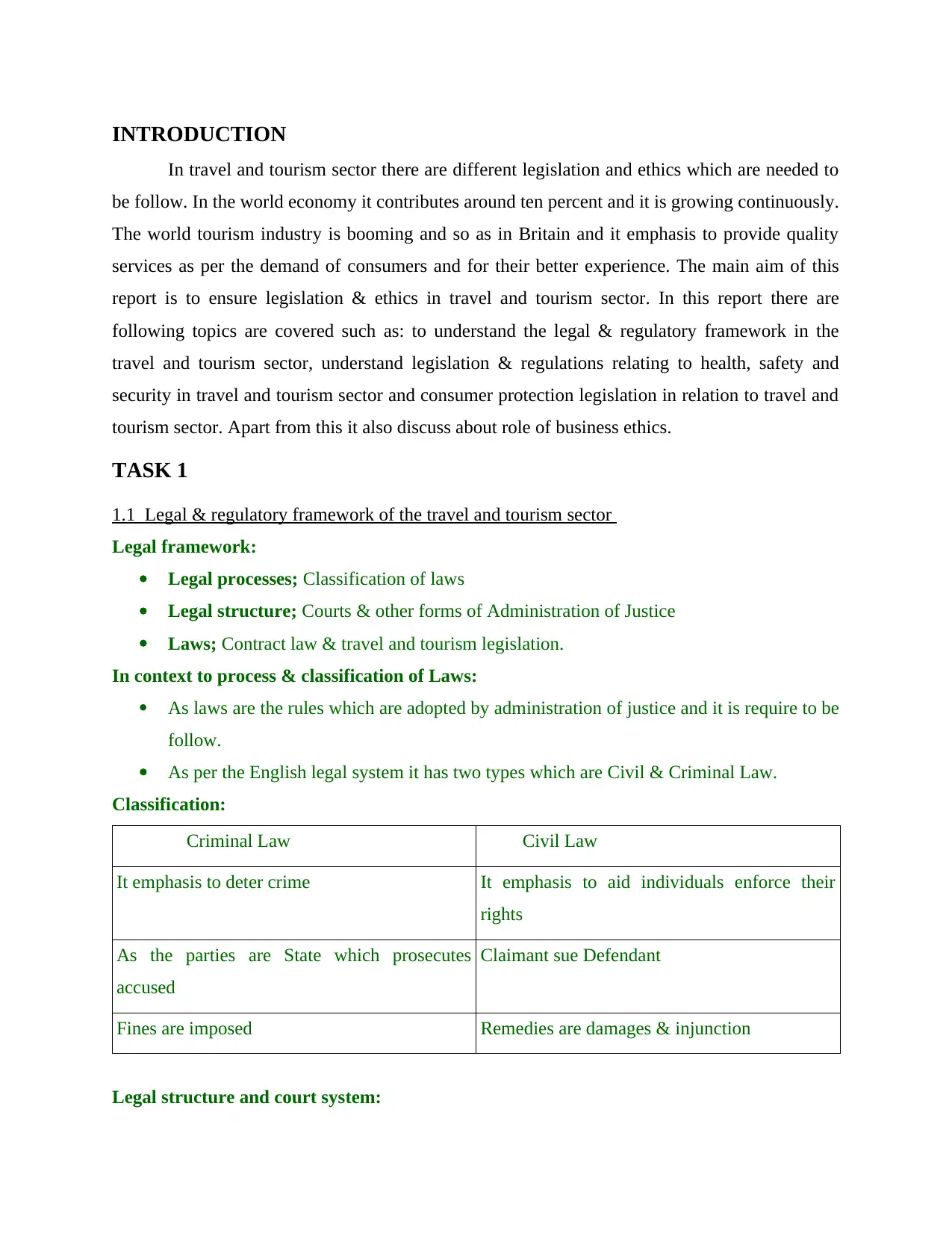
INTRODUCTION
In travel and tourism sector there are different legislation and ethics which are needed to
be follow. In the world economy it contributes around ten percent and it is growing continuously.
The world tourism industry is booming and so as in Britain and it emphasis to provide quality
services as per the demand of consumers and for their better experience. The main aim of this
report is to ensure legislation & ethics in travel and tourism sector. In this report there are
following topics are covered such as: to understand the legal & regulatory framework in the
travel and tourism sector, understand legislation & regulations relating to health, safety and
security in travel and tourism sector and consumer protection legislation in relation to travel and
tourism sector. Apart from this it also discuss about role of business ethics.
TASK 1
1.1 Legal & regulatory framework of the travel and tourism sector
Legal framework:
Legal processes; Classification of laws
Legal structure; Courts & other forms of Administration of Justice
Laws; Contract law & travel and tourism legislation.
In context to process & classification of Laws:
As laws are the rules which are adopted by administration of justice and it is require to be
follow.
As per the English legal system it has two types which are Civil & Criminal Law.
Classification:
Criminal Law Civil Law
It emphasis to deter crime It emphasis to aid individuals enforce their
rights
As the parties are State which prosecutes
accused
Claimant sue Defendant
Fines are imposed Remedies are damages & injunction
Legal structure and court system:
In travel and tourism sector there are different legislation and ethics which are needed to
be follow. In the world economy it contributes around ten percent and it is growing continuously.
The world tourism industry is booming and so as in Britain and it emphasis to provide quality
services as per the demand of consumers and for their better experience. The main aim of this
report is to ensure legislation & ethics in travel and tourism sector. In this report there are
following topics are covered such as: to understand the legal & regulatory framework in the
travel and tourism sector, understand legislation & regulations relating to health, safety and
security in travel and tourism sector and consumer protection legislation in relation to travel and
tourism sector. Apart from this it also discuss about role of business ethics.
TASK 1
1.1 Legal & regulatory framework of the travel and tourism sector
Legal framework:
Legal processes; Classification of laws
Legal structure; Courts & other forms of Administration of Justice
Laws; Contract law & travel and tourism legislation.
In context to process & classification of Laws:
As laws are the rules which are adopted by administration of justice and it is require to be
follow.
As per the English legal system it has two types which are Civil & Criminal Law.
Classification:
Criminal Law Civil Law
It emphasis to deter crime It emphasis to aid individuals enforce their
rights
As the parties are State which prosecutes
accused
Claimant sue Defendant
Fines are imposed Remedies are damages & injunction
Legal structure and court system:
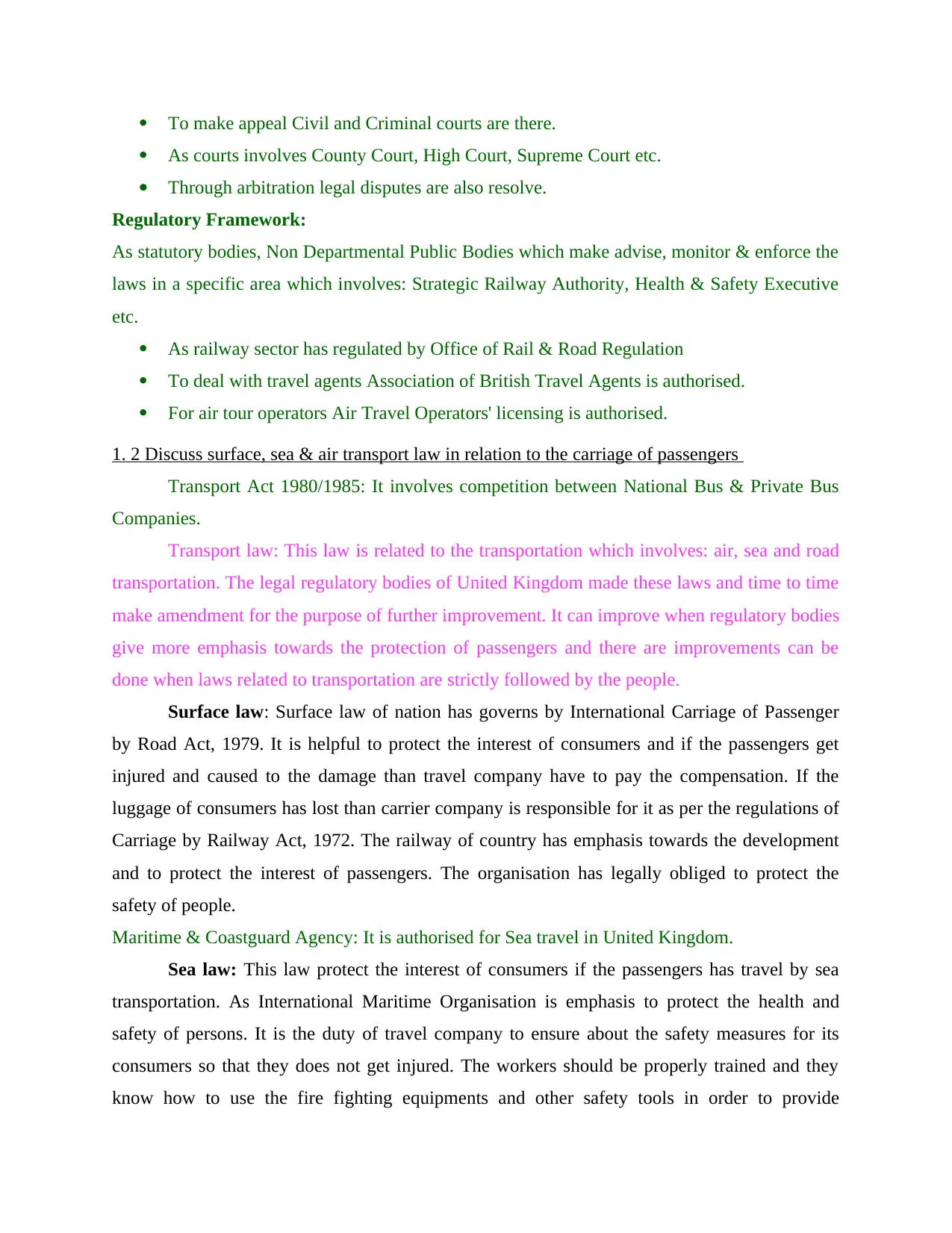
To make appeal Civil and Criminal courts are there.
As courts involves County Court, High Court, Supreme Court etc.
Through arbitration legal disputes are also resolve.
Regulatory Framework:
As statutory bodies, Non Departmental Public Bodies which make advise, monitor & enforce the
laws in a specific area which involves: Strategic Railway Authority, Health & Safety Executive
etc.
As railway sector has regulated by Office of Rail & Road Regulation
To deal with travel agents Association of British Travel Agents is authorised.
For air tour operators Air Travel Operators' licensing is authorised.
1. 2 Discuss surface, sea & air transport law in relation to the carriage of passengers
Transport Act 1980/1985: It involves competition between National Bus & Private Bus
Companies.
Transport law: This law is related to the transportation which involves: air, sea and road
transportation. The legal regulatory bodies of United Kingdom made these laws and time to time
make amendment for the purpose of further improvement. It can improve when regulatory bodies
give more emphasis towards the protection of passengers and there are improvements can be
done when laws related to transportation are strictly followed by the people.
Surface law: Surface law of nation has governs by International Carriage of Passenger
by Road Act, 1979. It is helpful to protect the interest of consumers and if the passengers get
injured and caused to the damage than travel company have to pay the compensation. If the
luggage of consumers has lost than carrier company is responsible for it as per the regulations of
Carriage by Railway Act, 1972. The railway of country has emphasis towards the development
and to protect the interest of passengers. The organisation has legally obliged to protect the
safety of people.
Maritime & Coastguard Agency: It is authorised for Sea travel in United Kingdom.
Sea law: This law protect the interest of consumers if the passengers has travel by sea
transportation. As International Maritime Organisation is emphasis to protect the health and
safety of persons. It is the duty of travel company to ensure about the safety measures for its
consumers so that they does not get injured. The workers should be properly trained and they
know how to use the fire fighting equipments and other safety tools in order to provide
As courts involves County Court, High Court, Supreme Court etc.
Through arbitration legal disputes are also resolve.
Regulatory Framework:
As statutory bodies, Non Departmental Public Bodies which make advise, monitor & enforce the
laws in a specific area which involves: Strategic Railway Authority, Health & Safety Executive
etc.
As railway sector has regulated by Office of Rail & Road Regulation
To deal with travel agents Association of British Travel Agents is authorised.
For air tour operators Air Travel Operators' licensing is authorised.
1. 2 Discuss surface, sea & air transport law in relation to the carriage of passengers
Transport Act 1980/1985: It involves competition between National Bus & Private Bus
Companies.
Transport law: This law is related to the transportation which involves: air, sea and road
transportation. The legal regulatory bodies of United Kingdom made these laws and time to time
make amendment for the purpose of further improvement. It can improve when regulatory bodies
give more emphasis towards the protection of passengers and there are improvements can be
done when laws related to transportation are strictly followed by the people.
Surface law: Surface law of nation has governs by International Carriage of Passenger
by Road Act, 1979. It is helpful to protect the interest of consumers and if the passengers get
injured and caused to the damage than travel company have to pay the compensation. If the
luggage of consumers has lost than carrier company is responsible for it as per the regulations of
Carriage by Railway Act, 1972. The railway of country has emphasis towards the development
and to protect the interest of passengers. The organisation has legally obliged to protect the
safety of people.
Maritime & Coastguard Agency: It is authorised for Sea travel in United Kingdom.
Sea law: This law protect the interest of consumers if the passengers has travel by sea
transportation. As International Maritime Organisation is emphasis to protect the health and
safety of persons. It is the duty of travel company to ensure about the safety measures for its
consumers so that they does not get injured. The workers should be properly trained and they
know how to use the fire fighting equipments and other safety tools in order to provide
Secure Best Marks with AI Grader
Need help grading? Try our AI Grader for instant feedback on your assignments.
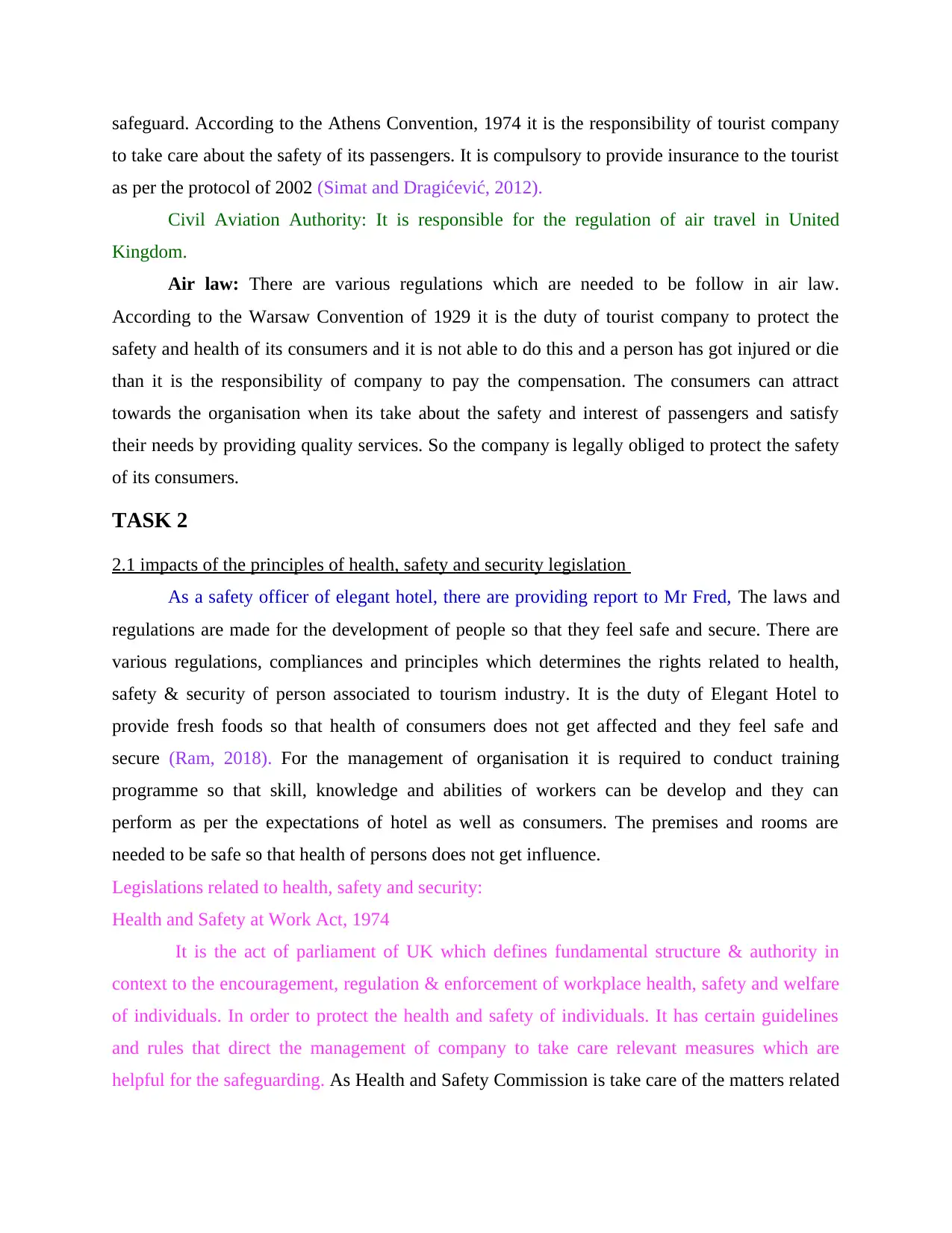
safeguard. According to the Athens Convention, 1974 it is the responsibility of tourist company
to take care about the safety of its passengers. It is compulsory to provide insurance to the tourist
as per the protocol of 2002 (Simat and Dragićević, 2012).
Civil Aviation Authority: It is responsible for the regulation of air travel in United
Kingdom.
Air law: There are various regulations which are needed to be follow in air law.
According to the Warsaw Convention of 1929 it is the duty of tourist company to protect the
safety and health of its consumers and it is not able to do this and a person has got injured or die
than it is the responsibility of company to pay the compensation. The consumers can attract
towards the organisation when its take about the safety and interest of passengers and satisfy
their needs by providing quality services. So the company is legally obliged to protect the safety
of its consumers.
TASK 2
2.1 impacts of the principles of health, safety and security legislation
As a safety officer of elegant hotel, there are providing report to Mr Fred, The laws and
regulations are made for the development of people so that they feel safe and secure. There are
various regulations, compliances and principles which determines the rights related to health,
safety & security of person associated to tourism industry. It is the duty of Elegant Hotel to
provide fresh foods so that health of consumers does not get affected and they feel safe and
secure (Ram, 2018). For the management of organisation it is required to conduct training
programme so that skill, knowledge and abilities of workers can be develop and they can
perform as per the expectations of hotel as well as consumers. The premises and rooms are
needed to be safe so that health of persons does not get influence.
Legislations related to health, safety and security:
Health and Safety at Work Act, 1974
It is the act of parliament of UK which defines fundamental structure & authority in
context to the encouragement, regulation & enforcement of workplace health, safety and welfare
of individuals. In order to protect the health and safety of individuals. It has certain guidelines
and rules that direct the management of company to take care relevant measures which are
helpful for the safeguarding. As Health and Safety Commission is take care of the matters related
to take care about the safety of its passengers. It is compulsory to provide insurance to the tourist
as per the protocol of 2002 (Simat and Dragićević, 2012).
Civil Aviation Authority: It is responsible for the regulation of air travel in United
Kingdom.
Air law: There are various regulations which are needed to be follow in air law.
According to the Warsaw Convention of 1929 it is the duty of tourist company to protect the
safety and health of its consumers and it is not able to do this and a person has got injured or die
than it is the responsibility of company to pay the compensation. The consumers can attract
towards the organisation when its take about the safety and interest of passengers and satisfy
their needs by providing quality services. So the company is legally obliged to protect the safety
of its consumers.
TASK 2
2.1 impacts of the principles of health, safety and security legislation
As a safety officer of elegant hotel, there are providing report to Mr Fred, The laws and
regulations are made for the development of people so that they feel safe and secure. There are
various regulations, compliances and principles which determines the rights related to health,
safety & security of person associated to tourism industry. It is the duty of Elegant Hotel to
provide fresh foods so that health of consumers does not get affected and they feel safe and
secure (Ram, 2018). For the management of organisation it is required to conduct training
programme so that skill, knowledge and abilities of workers can be develop and they can
perform as per the expectations of hotel as well as consumers. The premises and rooms are
needed to be safe so that health of persons does not get influence.
Legislations related to health, safety and security:
Health and Safety at Work Act, 1974
It is the act of parliament of UK which defines fundamental structure & authority in
context to the encouragement, regulation & enforcement of workplace health, safety and welfare
of individuals. In order to protect the health and safety of individuals. It has certain guidelines
and rules that direct the management of company to take care relevant measures which are
helpful for the safeguarding. As Health and Safety Commission is take care of the matters related
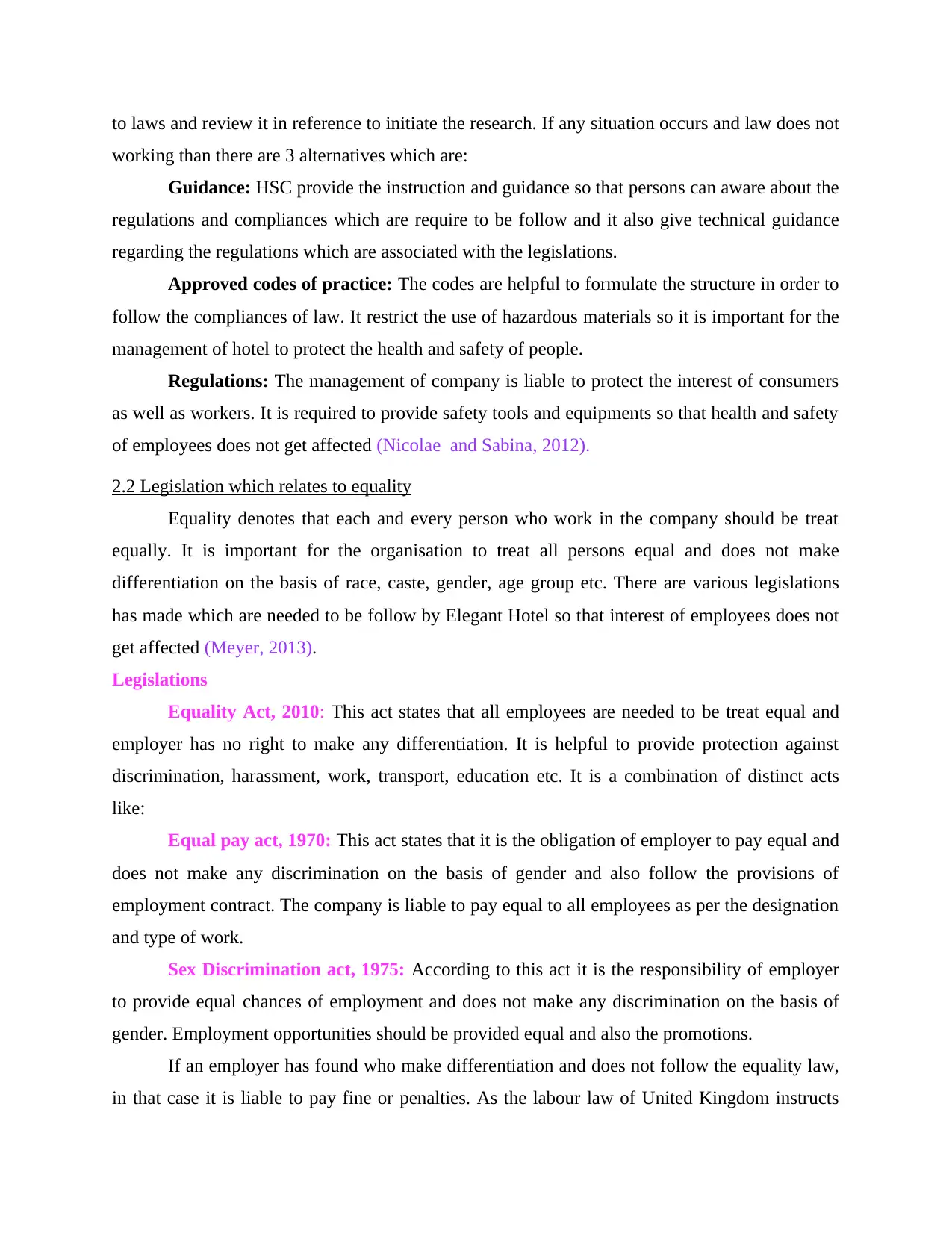
to laws and review it in reference to initiate the research. If any situation occurs and law does not
working than there are 3 alternatives which are:
Guidance: HSC provide the instruction and guidance so that persons can aware about the
regulations and compliances which are require to be follow and it also give technical guidance
regarding the regulations which are associated with the legislations.
Approved codes of practice: The codes are helpful to formulate the structure in order to
follow the compliances of law. It restrict the use of hazardous materials so it is important for the
management of hotel to protect the health and safety of people.
Regulations: The management of company is liable to protect the interest of consumers
as well as workers. It is required to provide safety tools and equipments so that health and safety
of employees does not get affected (Nicolae and Sabina, 2012).
2.2 Legislation which relates to equality
Equality denotes that each and every person who work in the company should be treat
equally. It is important for the organisation to treat all persons equal and does not make
differentiation on the basis of race, caste, gender, age group etc. There are various legislations
has made which are needed to be follow by Elegant Hotel so that interest of employees does not
get affected (Meyer, 2013).
Legislations
Equality Act, 2010: This act states that all employees are needed to be treat equal and
employer has no right to make any differentiation. It is helpful to provide protection against
discrimination, harassment, work, transport, education etc. It is a combination of distinct acts
like:
Equal pay act, 1970: This act states that it is the obligation of employer to pay equal and
does not make any discrimination on the basis of gender and also follow the provisions of
employment contract. The company is liable to pay equal to all employees as per the designation
and type of work.
Sex Discrimination act, 1975: According to this act it is the responsibility of employer
to provide equal chances of employment and does not make any discrimination on the basis of
gender. Employment opportunities should be provided equal and also the promotions.
If an employer has found who make differentiation and does not follow the equality law,
in that case it is liable to pay fine or penalties. As the labour law of United Kingdom instructs
working than there are 3 alternatives which are:
Guidance: HSC provide the instruction and guidance so that persons can aware about the
regulations and compliances which are require to be follow and it also give technical guidance
regarding the regulations which are associated with the legislations.
Approved codes of practice: The codes are helpful to formulate the structure in order to
follow the compliances of law. It restrict the use of hazardous materials so it is important for the
management of hotel to protect the health and safety of people.
Regulations: The management of company is liable to protect the interest of consumers
as well as workers. It is required to provide safety tools and equipments so that health and safety
of employees does not get affected (Nicolae and Sabina, 2012).
2.2 Legislation which relates to equality
Equality denotes that each and every person who work in the company should be treat
equally. It is important for the organisation to treat all persons equal and does not make
differentiation on the basis of race, caste, gender, age group etc. There are various legislations
has made which are needed to be follow by Elegant Hotel so that interest of employees does not
get affected (Meyer, 2013).
Legislations
Equality Act, 2010: This act states that all employees are needed to be treat equal and
employer has no right to make any differentiation. It is helpful to provide protection against
discrimination, harassment, work, transport, education etc. It is a combination of distinct acts
like:
Equal pay act, 1970: This act states that it is the obligation of employer to pay equal and
does not make any discrimination on the basis of gender and also follow the provisions of
employment contract. The company is liable to pay equal to all employees as per the designation
and type of work.
Sex Discrimination act, 1975: According to this act it is the responsibility of employer
to provide equal chances of employment and does not make any discrimination on the basis of
gender. Employment opportunities should be provided equal and also the promotions.
If an employer has found who make differentiation and does not follow the equality law,
in that case it is liable to pay fine or penalties. As the labour law of United Kingdom instructs
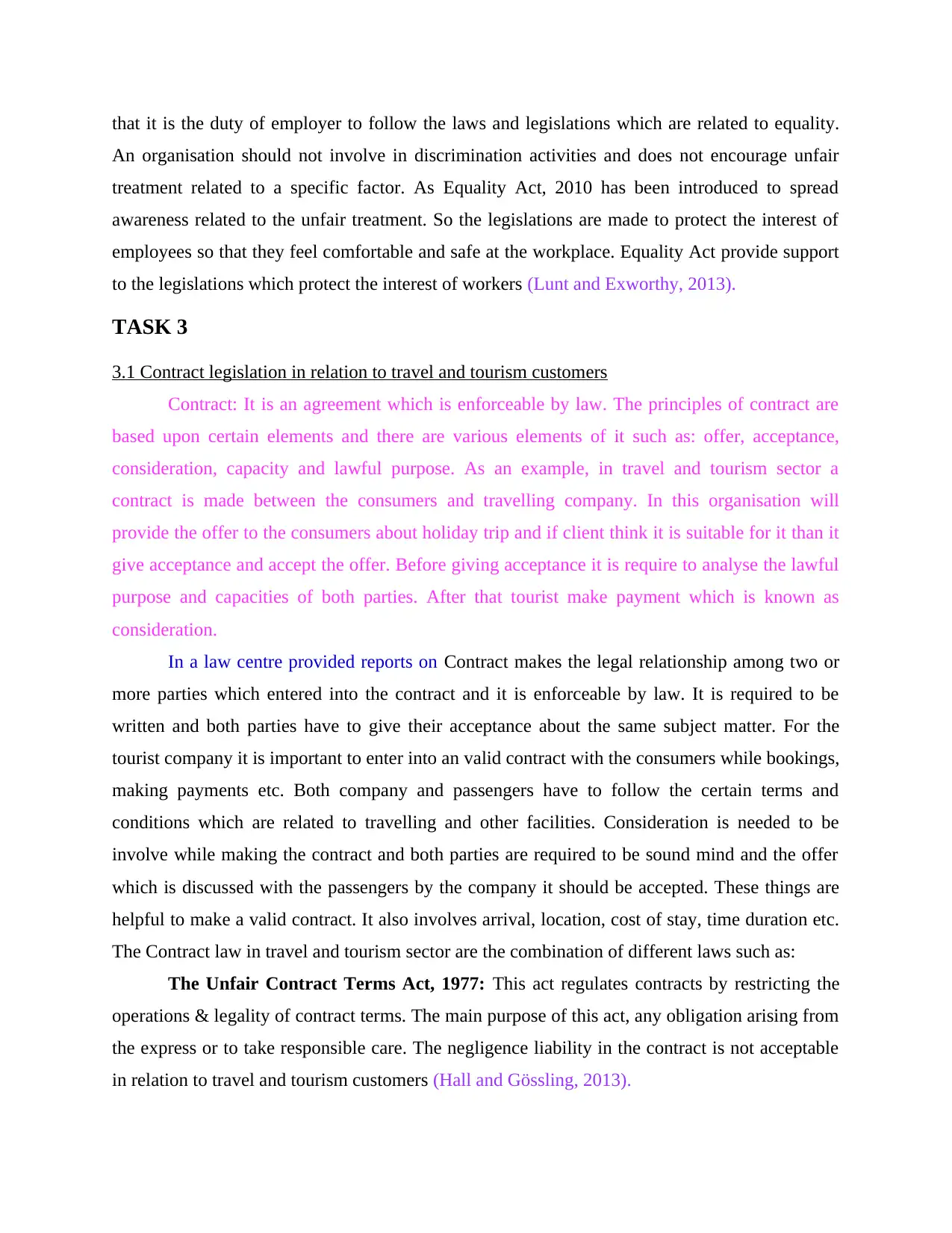
that it is the duty of employer to follow the laws and legislations which are related to equality.
An organisation should not involve in discrimination activities and does not encourage unfair
treatment related to a specific factor. As Equality Act, 2010 has been introduced to spread
awareness related to the unfair treatment. So the legislations are made to protect the interest of
employees so that they feel comfortable and safe at the workplace. Equality Act provide support
to the legislations which protect the interest of workers (Lunt and Exworthy, 2013).
TASK 3
3.1 Contract legislation in relation to travel and tourism customers
Contract: It is an agreement which is enforceable by law. The principles of contract are
based upon certain elements and there are various elements of it such as: offer, acceptance,
consideration, capacity and lawful purpose. As an example, in travel and tourism sector a
contract is made between the consumers and travelling company. In this organisation will
provide the offer to the consumers about holiday trip and if client think it is suitable for it than it
give acceptance and accept the offer. Before giving acceptance it is require to analyse the lawful
purpose and capacities of both parties. After that tourist make payment which is known as
consideration.
In a law centre provided reports on Contract makes the legal relationship among two or
more parties which entered into the contract and it is enforceable by law. It is required to be
written and both parties have to give their acceptance about the same subject matter. For the
tourist company it is important to enter into an valid contract with the consumers while bookings,
making payments etc. Both company and passengers have to follow the certain terms and
conditions which are related to travelling and other facilities. Consideration is needed to be
involve while making the contract and both parties are required to be sound mind and the offer
which is discussed with the passengers by the company it should be accepted. These things are
helpful to make a valid contract. It also involves arrival, location, cost of stay, time duration etc.
The Contract law in travel and tourism sector are the combination of different laws such as:
The Unfair Contract Terms Act, 1977: This act regulates contracts by restricting the
operations & legality of contract terms. The main purpose of this act, any obligation arising from
the express or to take responsible care. The negligence liability in the contract is not acceptable
in relation to travel and tourism customers (Hall and Gössling, 2013).
An organisation should not involve in discrimination activities and does not encourage unfair
treatment related to a specific factor. As Equality Act, 2010 has been introduced to spread
awareness related to the unfair treatment. So the legislations are made to protect the interest of
employees so that they feel comfortable and safe at the workplace. Equality Act provide support
to the legislations which protect the interest of workers (Lunt and Exworthy, 2013).
TASK 3
3.1 Contract legislation in relation to travel and tourism customers
Contract: It is an agreement which is enforceable by law. The principles of contract are
based upon certain elements and there are various elements of it such as: offer, acceptance,
consideration, capacity and lawful purpose. As an example, in travel and tourism sector a
contract is made between the consumers and travelling company. In this organisation will
provide the offer to the consumers about holiday trip and if client think it is suitable for it than it
give acceptance and accept the offer. Before giving acceptance it is require to analyse the lawful
purpose and capacities of both parties. After that tourist make payment which is known as
consideration.
In a law centre provided reports on Contract makes the legal relationship among two or
more parties which entered into the contract and it is enforceable by law. It is required to be
written and both parties have to give their acceptance about the same subject matter. For the
tourist company it is important to enter into an valid contract with the consumers while bookings,
making payments etc. Both company and passengers have to follow the certain terms and
conditions which are related to travelling and other facilities. Consideration is needed to be
involve while making the contract and both parties are required to be sound mind and the offer
which is discussed with the passengers by the company it should be accepted. These things are
helpful to make a valid contract. It also involves arrival, location, cost of stay, time duration etc.
The Contract law in travel and tourism sector are the combination of different laws such as:
The Unfair Contract Terms Act, 1977: This act regulates contracts by restricting the
operations & legality of contract terms. The main purpose of this act, any obligation arising from
the express or to take responsible care. The negligence liability in the contract is not acceptable
in relation to travel and tourism customers (Hall and Gössling, 2013).
Paraphrase This Document
Need a fresh take? Get an instant paraphrase of this document with our AI Paraphraser
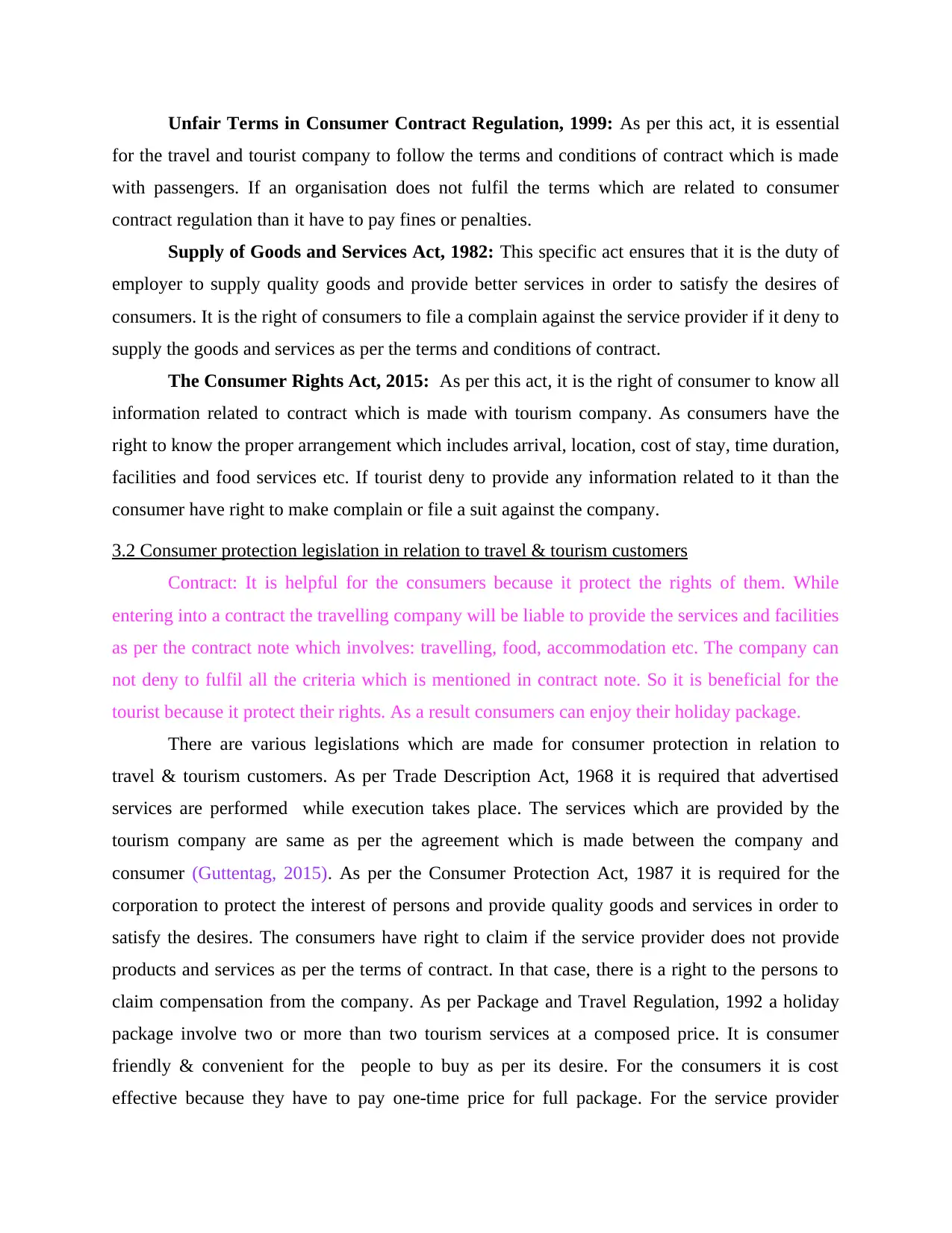
Unfair Terms in Consumer Contract Regulation, 1999: As per this act, it is essential
for the travel and tourist company to follow the terms and conditions of contract which is made
with passengers. If an organisation does not fulfil the terms which are related to consumer
contract regulation than it have to pay fines or penalties.
Supply of Goods and Services Act, 1982: This specific act ensures that it is the duty of
employer to supply quality goods and provide better services in order to satisfy the desires of
consumers. It is the right of consumers to file a complain against the service provider if it deny to
supply the goods and services as per the terms and conditions of contract.
The Consumer Rights Act, 2015: As per this act, it is the right of consumer to know all
information related to contract which is made with tourism company. As consumers have the
right to know the proper arrangement which includes arrival, location, cost of stay, time duration,
facilities and food services etc. If tourist deny to provide any information related to it than the
consumer have right to make complain or file a suit against the company.
3.2 Consumer protection legislation in relation to travel & tourism customers
Contract: It is helpful for the consumers because it protect the rights of them. While
entering into a contract the travelling company will be liable to provide the services and facilities
as per the contract note which involves: travelling, food, accommodation etc. The company can
not deny to fulfil all the criteria which is mentioned in contract note. So it is beneficial for the
tourist because it protect their rights. As a result consumers can enjoy their holiday package.
There are various legislations which are made for consumer protection in relation to
travel & tourism customers. As per Trade Description Act, 1968 it is required that advertised
services are performed while execution takes place. The services which are provided by the
tourism company are same as per the agreement which is made between the company and
consumer (Guttentag, 2015). As per the Consumer Protection Act, 1987 it is required for the
corporation to protect the interest of persons and provide quality goods and services in order to
satisfy the desires. The consumers have right to claim if the service provider does not provide
products and services as per the terms of contract. In that case, there is a right to the persons to
claim compensation from the company. As per Package and Travel Regulation, 1992 a holiday
package involve two or more than two tourism services at a composed price. It is consumer
friendly & convenient for the people to buy as per its desire. For the consumers it is cost
effective because they have to pay one-time price for full package. For the service provider
for the travel and tourist company to follow the terms and conditions of contract which is made
with passengers. If an organisation does not fulfil the terms which are related to consumer
contract regulation than it have to pay fines or penalties.
Supply of Goods and Services Act, 1982: This specific act ensures that it is the duty of
employer to supply quality goods and provide better services in order to satisfy the desires of
consumers. It is the right of consumers to file a complain against the service provider if it deny to
supply the goods and services as per the terms and conditions of contract.
The Consumer Rights Act, 2015: As per this act, it is the right of consumer to know all
information related to contract which is made with tourism company. As consumers have the
right to know the proper arrangement which includes arrival, location, cost of stay, time duration,
facilities and food services etc. If tourist deny to provide any information related to it than the
consumer have right to make complain or file a suit against the company.
3.2 Consumer protection legislation in relation to travel & tourism customers
Contract: It is helpful for the consumers because it protect the rights of them. While
entering into a contract the travelling company will be liable to provide the services and facilities
as per the contract note which involves: travelling, food, accommodation etc. The company can
not deny to fulfil all the criteria which is mentioned in contract note. So it is beneficial for the
tourist because it protect their rights. As a result consumers can enjoy their holiday package.
There are various legislations which are made for consumer protection in relation to
travel & tourism customers. As per Trade Description Act, 1968 it is required that advertised
services are performed while execution takes place. The services which are provided by the
tourism company are same as per the agreement which is made between the company and
consumer (Guttentag, 2015). As per the Consumer Protection Act, 1987 it is required for the
corporation to protect the interest of persons and provide quality goods and services in order to
satisfy the desires. The consumers have right to claim if the service provider does not provide
products and services as per the terms of contract. In that case, there is a right to the persons to
claim compensation from the company. As per Package and Travel Regulation, 1992 a holiday
package involve two or more than two tourism services at a composed price. It is consumer
friendly & convenient for the people to buy as per its desire. For the consumers it is cost
effective because they have to pay one-time price for full package. For the service provider
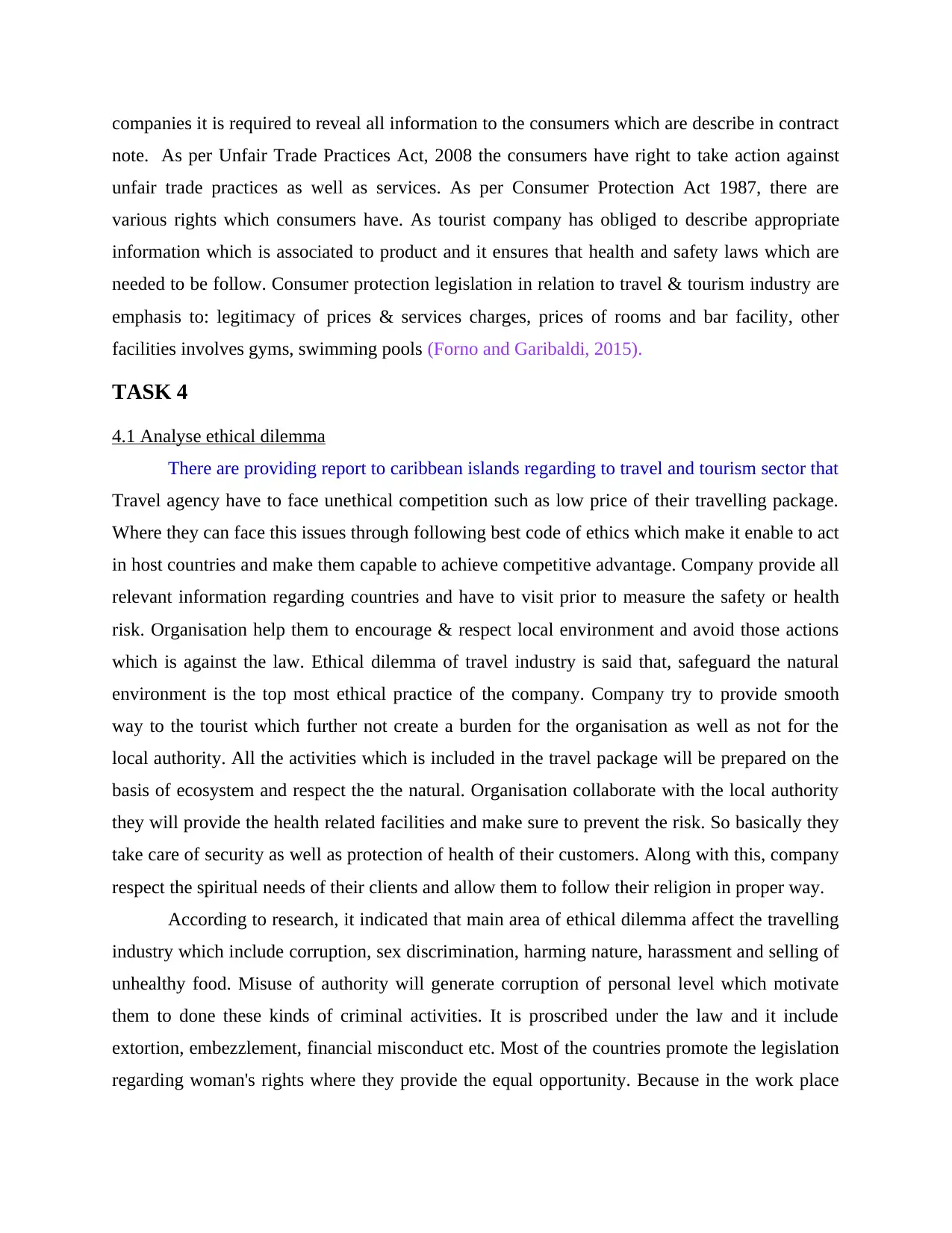
companies it is required to reveal all information to the consumers which are describe in contract
note. As per Unfair Trade Practices Act, 2008 the consumers have right to take action against
unfair trade practices as well as services. As per Consumer Protection Act 1987, there are
various rights which consumers have. As tourist company has obliged to describe appropriate
information which is associated to product and it ensures that health and safety laws which are
needed to be follow. Consumer protection legislation in relation to travel & tourism industry are
emphasis to: legitimacy of prices & services charges, prices of rooms and bar facility, other
facilities involves gyms, swimming pools (Forno and Garibaldi, 2015).
TASK 4
4.1 Analyse ethical dilemma
There are providing report to caribbean islands regarding to travel and tourism sector that
Travel agency have to face unethical competition such as low price of their travelling package.
Where they can face this issues through following best code of ethics which make it enable to act
in host countries and make them capable to achieve competitive advantage. Company provide all
relevant information regarding countries and have to visit prior to measure the safety or health
risk. Organisation help them to encourage & respect local environment and avoid those actions
which is against the law. Ethical dilemma of travel industry is said that, safeguard the natural
environment is the top most ethical practice of the company. Company try to provide smooth
way to the tourist which further not create a burden for the organisation as well as not for the
local authority. All the activities which is included in the travel package will be prepared on the
basis of ecosystem and respect the the natural. Organisation collaborate with the local authority
they will provide the health related facilities and make sure to prevent the risk. So basically they
take care of security as well as protection of health of their customers. Along with this, company
respect the spiritual needs of their clients and allow them to follow their religion in proper way.
According to research, it indicated that main area of ethical dilemma affect the travelling
industry which include corruption, sex discrimination, harming nature, harassment and selling of
unhealthy food. Misuse of authority will generate corruption of personal level which motivate
them to done these kinds of criminal activities. It is proscribed under the law and it include
extortion, embezzlement, financial misconduct etc. Most of the countries promote the legislation
regarding woman's rights where they provide the equal opportunity. Because in the work place
note. As per Unfair Trade Practices Act, 2008 the consumers have right to take action against
unfair trade practices as well as services. As per Consumer Protection Act 1987, there are
various rights which consumers have. As tourist company has obliged to describe appropriate
information which is associated to product and it ensures that health and safety laws which are
needed to be follow. Consumer protection legislation in relation to travel & tourism industry are
emphasis to: legitimacy of prices & services charges, prices of rooms and bar facility, other
facilities involves gyms, swimming pools (Forno and Garibaldi, 2015).
TASK 4
4.1 Analyse ethical dilemma
There are providing report to caribbean islands regarding to travel and tourism sector that
Travel agency have to face unethical competition such as low price of their travelling package.
Where they can face this issues through following best code of ethics which make it enable to act
in host countries and make them capable to achieve competitive advantage. Company provide all
relevant information regarding countries and have to visit prior to measure the safety or health
risk. Organisation help them to encourage & respect local environment and avoid those actions
which is against the law. Ethical dilemma of travel industry is said that, safeguard the natural
environment is the top most ethical practice of the company. Company try to provide smooth
way to the tourist which further not create a burden for the organisation as well as not for the
local authority. All the activities which is included in the travel package will be prepared on the
basis of ecosystem and respect the the natural. Organisation collaborate with the local authority
they will provide the health related facilities and make sure to prevent the risk. So basically they
take care of security as well as protection of health of their customers. Along with this, company
respect the spiritual needs of their clients and allow them to follow their religion in proper way.
According to research, it indicated that main area of ethical dilemma affect the travelling
industry which include corruption, sex discrimination, harming nature, harassment and selling of
unhealthy food. Misuse of authority will generate corruption of personal level which motivate
them to done these kinds of criminal activities. It is proscribed under the law and it include
extortion, embezzlement, financial misconduct etc. Most of the countries promote the legislation
regarding woman's rights where they provide the equal opportunity. Because in the work place
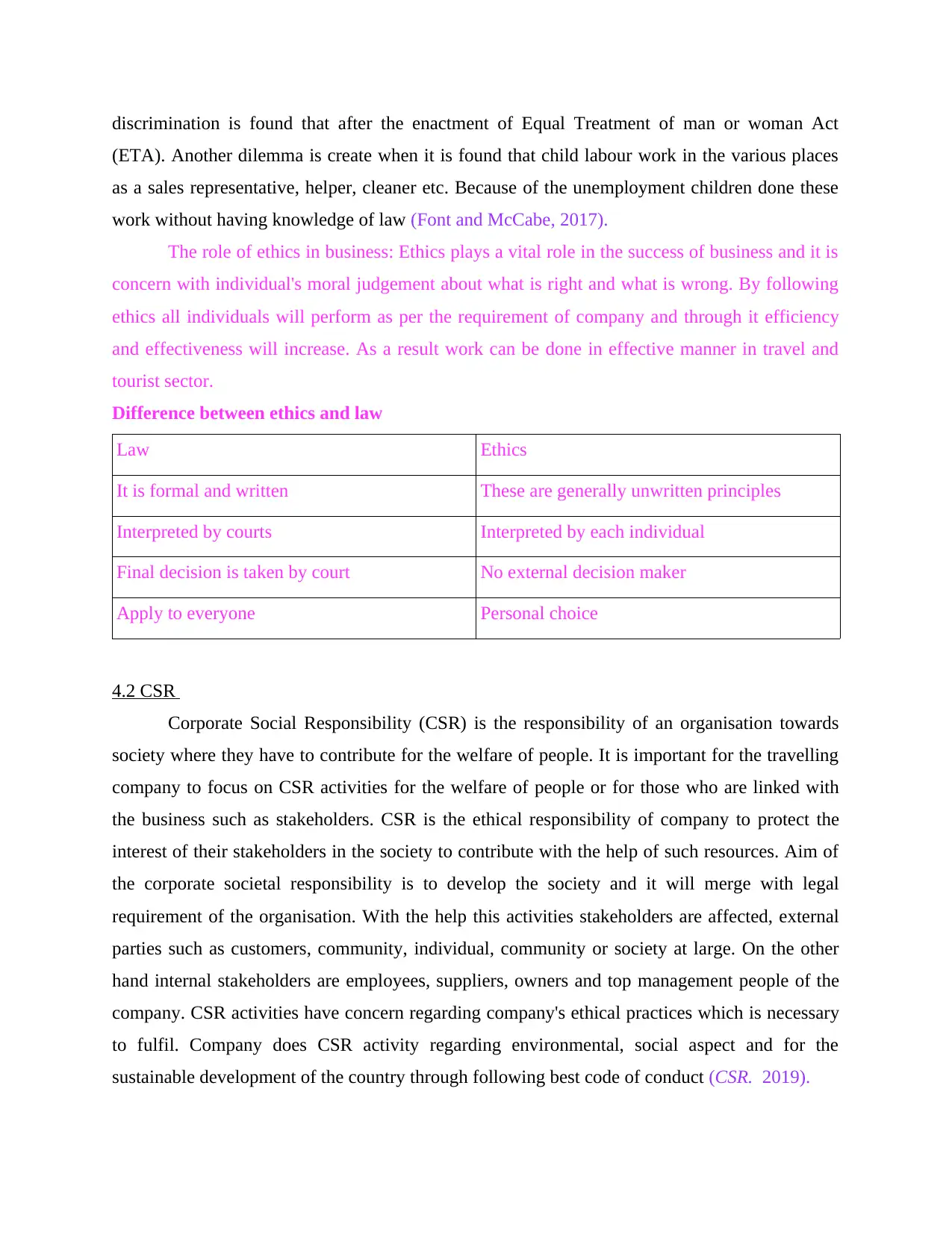
discrimination is found that after the enactment of Equal Treatment of man or woman Act
(ETA). Another dilemma is create when it is found that child labour work in the various places
as a sales representative, helper, cleaner etc. Because of the unemployment children done these
work without having knowledge of law (Font and McCabe, 2017).
The role of ethics in business: Ethics plays a vital role in the success of business and it is
concern with individual's moral judgement about what is right and what is wrong. By following
ethics all individuals will perform as per the requirement of company and through it efficiency
and effectiveness will increase. As a result work can be done in effective manner in travel and
tourist sector.
Difference between ethics and law
Law Ethics
It is formal and written These are generally unwritten principles
Interpreted by courts Interpreted by each individual
Final decision is taken by court No external decision maker
Apply to everyone Personal choice
4.2 CSR
Corporate Social Responsibility (CSR) is the responsibility of an organisation towards
society where they have to contribute for the welfare of people. It is important for the travelling
company to focus on CSR activities for the welfare of people or for those who are linked with
the business such as stakeholders. CSR is the ethical responsibility of company to protect the
interest of their stakeholders in the society to contribute with the help of such resources. Aim of
the corporate societal responsibility is to develop the society and it will merge with legal
requirement of the organisation. With the help this activities stakeholders are affected, external
parties such as customers, community, individual, community or society at large. On the other
hand internal stakeholders are employees, suppliers, owners and top management people of the
company. CSR activities have concern regarding company's ethical practices which is necessary
to fulfil. Company does CSR activity regarding environmental, social aspect and for the
sustainable development of the country through following best code of conduct (CSR. 2019).
(ETA). Another dilemma is create when it is found that child labour work in the various places
as a sales representative, helper, cleaner etc. Because of the unemployment children done these
work without having knowledge of law (Font and McCabe, 2017).
The role of ethics in business: Ethics plays a vital role in the success of business and it is
concern with individual's moral judgement about what is right and what is wrong. By following
ethics all individuals will perform as per the requirement of company and through it efficiency
and effectiveness will increase. As a result work can be done in effective manner in travel and
tourist sector.
Difference between ethics and law
Law Ethics
It is formal and written These are generally unwritten principles
Interpreted by courts Interpreted by each individual
Final decision is taken by court No external decision maker
Apply to everyone Personal choice
4.2 CSR
Corporate Social Responsibility (CSR) is the responsibility of an organisation towards
society where they have to contribute for the welfare of people. It is important for the travelling
company to focus on CSR activities for the welfare of people or for those who are linked with
the business such as stakeholders. CSR is the ethical responsibility of company to protect the
interest of their stakeholders in the society to contribute with the help of such resources. Aim of
the corporate societal responsibility is to develop the society and it will merge with legal
requirement of the organisation. With the help this activities stakeholders are affected, external
parties such as customers, community, individual, community or society at large. On the other
hand internal stakeholders are employees, suppliers, owners and top management people of the
company. CSR activities have concern regarding company's ethical practices which is necessary
to fulfil. Company does CSR activity regarding environmental, social aspect and for the
sustainable development of the country through following best code of conduct (CSR. 2019).
Secure Best Marks with AI Grader
Need help grading? Try our AI Grader for instant feedback on your assignments.
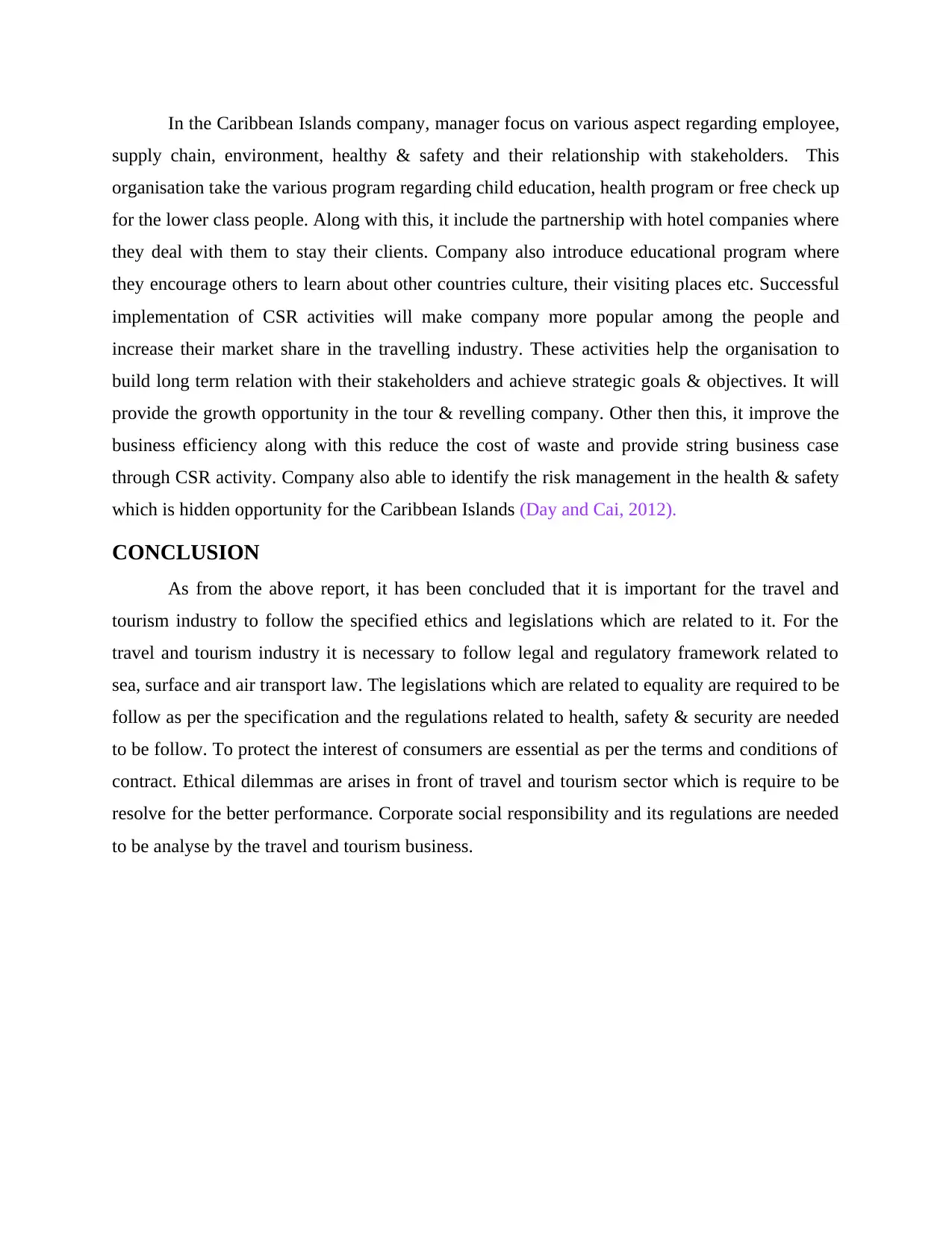
In the Caribbean Islands company, manager focus on various aspect regarding employee,
supply chain, environment, healthy & safety and their relationship with stakeholders. This
organisation take the various program regarding child education, health program or free check up
for the lower class people. Along with this, it include the partnership with hotel companies where
they deal with them to stay their clients. Company also introduce educational program where
they encourage others to learn about other countries culture, their visiting places etc. Successful
implementation of CSR activities will make company more popular among the people and
increase their market share in the travelling industry. These activities help the organisation to
build long term relation with their stakeholders and achieve strategic goals & objectives. It will
provide the growth opportunity in the tour & revelling company. Other then this, it improve the
business efficiency along with this reduce the cost of waste and provide string business case
through CSR activity. Company also able to identify the risk management in the health & safety
which is hidden opportunity for the Caribbean Islands (Day and Cai, 2012).
CONCLUSION
As from the above report, it has been concluded that it is important for the travel and
tourism industry to follow the specified ethics and legislations which are related to it. For the
travel and tourism industry it is necessary to follow legal and regulatory framework related to
sea, surface and air transport law. The legislations which are related to equality are required to be
follow as per the specification and the regulations related to health, safety & security are needed
to be follow. To protect the interest of consumers are essential as per the terms and conditions of
contract. Ethical dilemmas are arises in front of travel and tourism sector which is require to be
resolve for the better performance. Corporate social responsibility and its regulations are needed
to be analyse by the travel and tourism business.
supply chain, environment, healthy & safety and their relationship with stakeholders. This
organisation take the various program regarding child education, health program or free check up
for the lower class people. Along with this, it include the partnership with hotel companies where
they deal with them to stay their clients. Company also introduce educational program where
they encourage others to learn about other countries culture, their visiting places etc. Successful
implementation of CSR activities will make company more popular among the people and
increase their market share in the travelling industry. These activities help the organisation to
build long term relation with their stakeholders and achieve strategic goals & objectives. It will
provide the growth opportunity in the tour & revelling company. Other then this, it improve the
business efficiency along with this reduce the cost of waste and provide string business case
through CSR activity. Company also able to identify the risk management in the health & safety
which is hidden opportunity for the Caribbean Islands (Day and Cai, 2012).
CONCLUSION
As from the above report, it has been concluded that it is important for the travel and
tourism industry to follow the specified ethics and legislations which are related to it. For the
travel and tourism industry it is necessary to follow legal and regulatory framework related to
sea, surface and air transport law. The legislations which are related to equality are required to be
follow as per the specification and the regulations related to health, safety & security are needed
to be follow. To protect the interest of consumers are essential as per the terms and conditions of
contract. Ethical dilemmas are arises in front of travel and tourism sector which is require to be
resolve for the better performance. Corporate social responsibility and its regulations are needed
to be analyse by the travel and tourism business.
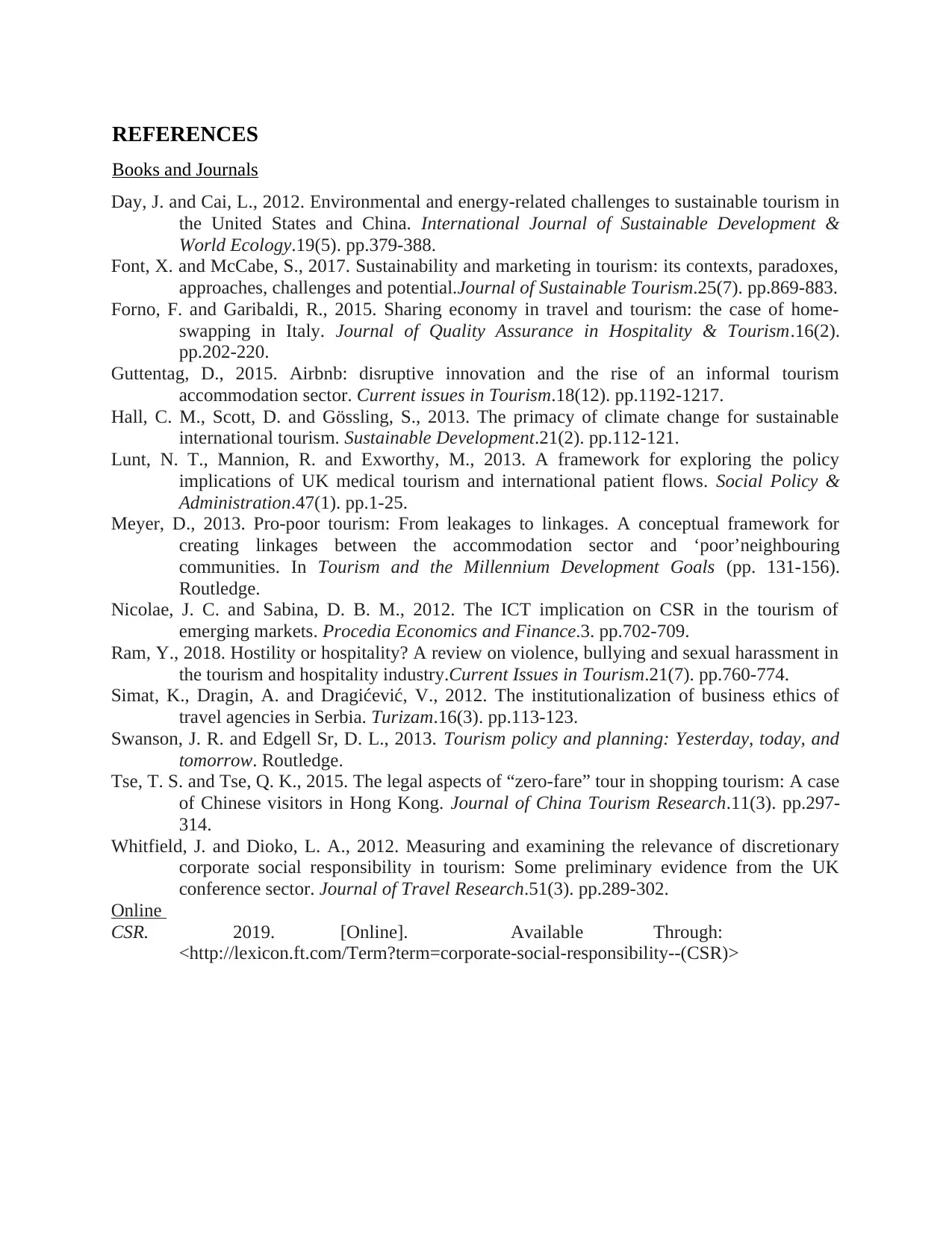
REFERENCES
Books and Journals
Day, J. and Cai, L., 2012. Environmental and energy-related challenges to sustainable tourism in
the United States and China. International Journal of Sustainable Development &
World Ecology.19(5). pp.379-388.
Font, X. and McCabe, S., 2017. Sustainability and marketing in tourism: its contexts, paradoxes,
approaches, challenges and potential.Journal of Sustainable Tourism.25(7). pp.869-883.
Forno, F. and Garibaldi, R., 2015. Sharing economy in travel and tourism: the case of home-
swapping in Italy. Journal of Quality Assurance in Hospitality & Tourism.16(2).
pp.202-220.
Guttentag, D., 2015. Airbnb: disruptive innovation and the rise of an informal tourism
accommodation sector. Current issues in Tourism.18(12). pp.1192-1217.
Hall, C. M., Scott, D. and Gössling, S., 2013. The primacy of climate change for sustainable
international tourism. Sustainable Development.21(2). pp.112-121.
Lunt, N. T., Mannion, R. and Exworthy, M., 2013. A framework for exploring the policy
implications of UK medical tourism and international patient flows. Social Policy &
Administration.47(1). pp.1-25.
Meyer, D., 2013. Pro-poor tourism: From leakages to linkages. A conceptual framework for
creating linkages between the accommodation sector and ‘poor’neighbouring
communities. In Tourism and the Millennium Development Goals (pp. 131-156).
Routledge.
Nicolae, J. C. and Sabina, D. B. M., 2012. The ICT implication on CSR in the tourism of
emerging markets. Procedia Economics and Finance.3. pp.702-709.
Ram, Y., 2018. Hostility or hospitality? A review on violence, bullying and sexual harassment in
the tourism and hospitality industry.Current Issues in Tourism.21(7). pp.760-774.
Simat, K., Dragin, A. and Dragićević, V., 2012. The institutionalization of business ethics of
travel agencies in Serbia. Turizam.16(3). pp.113-123.
Swanson, J. R. and Edgell Sr, D. L., 2013. Tourism policy and planning: Yesterday, today, and
tomorrow. Routledge.
Tse, T. S. and Tse, Q. K., 2015. The legal aspects of “zero-fare” tour in shopping tourism: A case
of Chinese visitors in Hong Kong. Journal of China Tourism Research.11(3). pp.297-
314.
Whitfield, J. and Dioko, L. A., 2012. Measuring and examining the relevance of discretionary
corporate social responsibility in tourism: Some preliminary evidence from the UK
conference sector. Journal of Travel Research.51(3). pp.289-302.
Online
CSR. 2019. [Online]. Available Through:
<http://lexicon.ft.com/Term?term=corporate-social-responsibility--(CSR)>
Books and Journals
Day, J. and Cai, L., 2012. Environmental and energy-related challenges to sustainable tourism in
the United States and China. International Journal of Sustainable Development &
World Ecology.19(5). pp.379-388.
Font, X. and McCabe, S., 2017. Sustainability and marketing in tourism: its contexts, paradoxes,
approaches, challenges and potential.Journal of Sustainable Tourism.25(7). pp.869-883.
Forno, F. and Garibaldi, R., 2015. Sharing economy in travel and tourism: the case of home-
swapping in Italy. Journal of Quality Assurance in Hospitality & Tourism.16(2).
pp.202-220.
Guttentag, D., 2015. Airbnb: disruptive innovation and the rise of an informal tourism
accommodation sector. Current issues in Tourism.18(12). pp.1192-1217.
Hall, C. M., Scott, D. and Gössling, S., 2013. The primacy of climate change for sustainable
international tourism. Sustainable Development.21(2). pp.112-121.
Lunt, N. T., Mannion, R. and Exworthy, M., 2013. A framework for exploring the policy
implications of UK medical tourism and international patient flows. Social Policy &
Administration.47(1). pp.1-25.
Meyer, D., 2013. Pro-poor tourism: From leakages to linkages. A conceptual framework for
creating linkages between the accommodation sector and ‘poor’neighbouring
communities. In Tourism and the Millennium Development Goals (pp. 131-156).
Routledge.
Nicolae, J. C. and Sabina, D. B. M., 2012. The ICT implication on CSR in the tourism of
emerging markets. Procedia Economics and Finance.3. pp.702-709.
Ram, Y., 2018. Hostility or hospitality? A review on violence, bullying and sexual harassment in
the tourism and hospitality industry.Current Issues in Tourism.21(7). pp.760-774.
Simat, K., Dragin, A. and Dragićević, V., 2012. The institutionalization of business ethics of
travel agencies in Serbia. Turizam.16(3). pp.113-123.
Swanson, J. R. and Edgell Sr, D. L., 2013. Tourism policy and planning: Yesterday, today, and
tomorrow. Routledge.
Tse, T. S. and Tse, Q. K., 2015. The legal aspects of “zero-fare” tour in shopping tourism: A case
of Chinese visitors in Hong Kong. Journal of China Tourism Research.11(3). pp.297-
314.
Whitfield, J. and Dioko, L. A., 2012. Measuring and examining the relevance of discretionary
corporate social responsibility in tourism: Some preliminary evidence from the UK
conference sector. Journal of Travel Research.51(3). pp.289-302.
Online
CSR. 2019. [Online]. Available Through:
<http://lexicon.ft.com/Term?term=corporate-social-responsibility--(CSR)>
1 out of 12
Related Documents
Your All-in-One AI-Powered Toolkit for Academic Success.
+13062052269
info@desklib.com
Available 24*7 on WhatsApp / Email
![[object Object]](/_next/static/media/star-bottom.7253800d.svg)
Unlock your academic potential
© 2024 | Zucol Services PVT LTD | All rights reserved.




